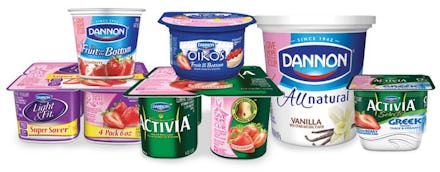Dannon Yogurt Might Get More Expensive Soon — But the Reason Is Actually Pretty Awesome

Genetically-modified organisms (GMOs) have been on consumers' minds for the past few years, and soon, they'll be removed from some top yogurt brands.
On Thursday, the Dannon Company announced it will source milk exclusively from cows fed with non-GMO feed. The company expects to offer three yogurt lines that are fully GMO-free by 2018.
To make their pledge a reality, Dannon has partnered with the Non-GMO Project, the nonprofit that created and regulates the "GMO-free" butterfly label on food products, and Green America, a nonprofit that helps companies create sustainable supply chains.
What will change? Dannon's Danimals, Oikos, and Dannon brand yogurts will be completely GMO-free by 2018. While most of its products have roughly 14 to 18 ingredients, the products will soon be pared down to an average of 10 ingredients that will be as "natural" as possible, Mariano Lozano, president and CEO of The Dannon Company, said during a press conference about Dannon's move toward GMO-free.
Dannon will need to seriously shift its supply chain. To make its products GMO-free, Dannon will need to ensure that the roughly 45,000 cows providing their milk do not consume GMO feed, Alisa Gravitz, the president and CEO of Green America, said during a press conference. That means 80,000 acres of farmland will need to produce non-GMO corn feed.
A whopping 90% of U.S. feed is currently created with GMOs, said Gary Hirshberg, the founder of Stonyfield's Organic Yogurt. Hirshberg is now the chairman of Just Label It, an organization that promotes GMO labeling.
Creating a new supply of non-GMO corn feed will undoubtedly come with a cost. According to a 2010 study from Iowa State University, corn-based products would be 6% more expensive if genetically-modified crops were not grown.
"We strongly believe that this will provide value for our consumers," Lozano, the president of Dannon, said when asked whether the GMO-free pledge would change the price of yogurt. "We are working hard to offset extra costs."
Anyone who's strolled the organic aisle at Whole Foods knows that buying nonconventional products comes at a price. According to the Food and Agriculture Organization of the United Nations, organic products are typically costly because organic produce must be segregated from conventional products during processing and transportation.
Why pay up for a cup of GMO-free Greek yogurt? It indirectly creates a more sustainable environment. GMOs are engineered to make crops herbicide-resistant, so farmers may use more herbicide than before. Glyphosate, an active ingredient in herbicide, is bad for birds, insects and wildlife, the Environmental Working Group noted. And Gravitz pointed out at the Dannon press conference that glyphosate is an antibiotic that kills microorganisms that are important for soil health. It's also present in rainwater and streams, Hirshberg noted.
GMO-free yogurt just might be the perfect dairy base for your artisan granola, if you're into that sort of thing.
Read more: